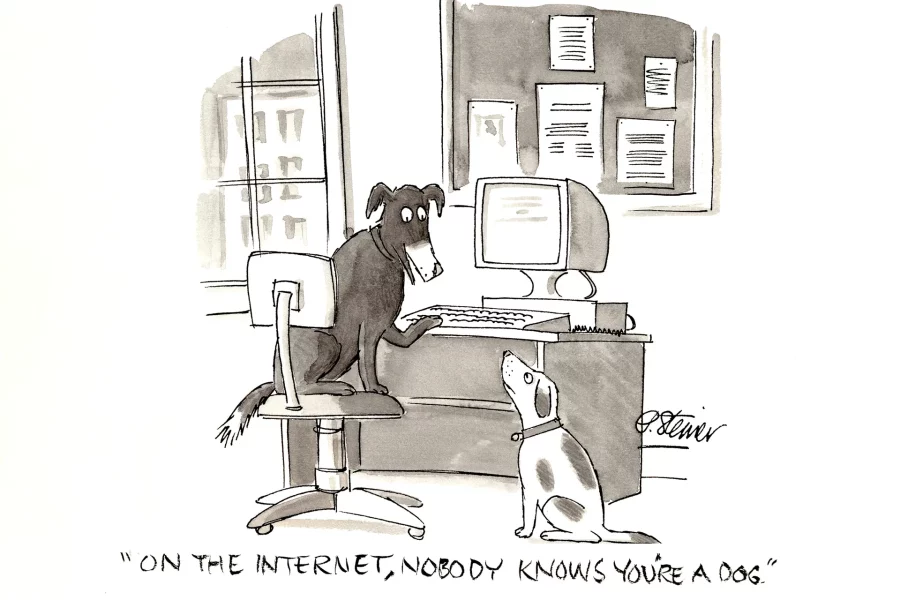On the Internet, nobody knows you’re a dog.
——Peter Steiner,1993
Communication and Information technologies have fundamentally changed the structure of society, organizations, and modes of operation (Castells, M., 1996). The digital world provides every user with the ability to start over, meaning that you can join the digital world in a way that rebuilds a new digital identity without being influenced by your identity, age, appearance in the real world. The cyberspace is composed of socially interconnected spaces (Devin Proctor, 2021). The social aspects of the real world are mapped to the digital world, which intensifies the complexity of the digital world. As users, should we trust the “users” that have been built in the digital world?

We learned about Goffman’s theory on self-presentation (Goffman, E., 2023). This socialised front-stage performance behaviour makes people perform according to frames, achieving ideal self-presentation through idealised performance, compensatory performance, and receiving friendly and pleasant evaluations from others. The emergence of the digital world fundamentally provides people with a new stage, and the choices of profile pictures, personal signatures, and photos on social media are all forms of self-presentation in the network, which indirectly reflect the users’ personality traits. The risks of self-presentation are also obvious: exaggerated and false self-embellishment is more likely to lead to deceptive dating, and interaction methods such as liking and commenting will also exacerbate people’s unclear self-awareness and social fatigue.
Authenticity Concerns
In 2021, Iconducted an interesting social survey where I created accounts on multiple social media platforms with different genders (male, female, gay men, and lesbians) to chat with other users. During this process, I found that users had difficulty discovering the actual gender of the person they were communicating with. In 1996, scholars expressed concerns about the authenticity of the digital world (Turkle, S., 1996). The 20 years of development have accelerated the development of the digital world, but the authenticity problem has not been solved. The only solution is to cultivate critical thinking among digital world users.

The Spiral Of Silence
We can trust information in the digital world, but we should also maintain a healthy dose of scepticism. We know that false information exists in the digital world, but have we ever considered the possibility of false “users” in the digital world? The term “Internet water army” is a keyword in China’s Internet society. These fake users are often led by a person or organisation and post consistent comments in an Internet region (such as a website or a post). In the field of communication, there is a well-known concept called “The Spiral of Silence” (Noelle-Neumann, E., 1974.). The silence of one side leads to the strengthening of the other side, and this cycle repeats itself, forming a spiral in which one side’s voice becomes more substantial, and the other side becomes increasingly silent.
One last question, do you really believe in the title?
- Reference
·Castells, M., 1996. The information age: Economy, society and culture (3 volumes). Blackwell, Oxford, 1997, p.1998.
·Fleishman, Glenn. Cartoon Captures Spirit of the Internet. The New York Times. 2000-12-14 [2007-10-01].
·Goffman, E., 2023. The presentation of self in everyday life. In Social theory re-wired (pp. 450-459). Routledge.
·Noelle-Neumann, E., 1974. The spiral of silence a theory of public opinion. Journal of communication, 24(2), pp.43-51.
·Proctor, D., 2021. The social production of internet space: Affordance, programming, and virtuality. Communication Theory, 31(4), pp.593-612.
·Turkle, S., 1996. Virtuality and its discontents: Searching for community in cyberspace. American Prospect, pp.50-58.
·Noelle-Neumann, E., 1974. The spiral of silence a theory of public opinion. Journal of communication, 24(2), pp.43-51.


☺️你好,亲爱的,我被这个标题吸引了,哈哈哈哈哈哈哈哈!老实说,我一直在思考互联网用户的性别,在中国总有一些男性会把性别改为女性,并发表奇怪的评论,试图引起男女之间的对抗。我认为你真的应该警惕互联网,有很多内容是假的,你不应该在互联网上发布任何个人信息或个人信息。最后,我希望你能在网上找到更多的幸福!❤️
Hello dear, I was drawn in by the title hahahahahahahaha! To be honest I’ve been thinking a lot about the gender of internet users, there are always some men in China who will change their gender to female and make strange comments to try to cause confrontation between men and women. I think people should really be vigilant about the internet, there’s a lot of content that’s false and people shouldn’t post any personal information or anything personal on the internet. In the end I hope you can draw more happiness from the internet!☺️
Thanks Xinyi!Yes, the issue of gender conflict does exist, and I also agree that some problems have been intentionally exacerbated by certain individuals during this process. The privacy and usage thresholds on the internet are too low, and the proliferation of false information is a byproduct of the strong connectivity of the internet. I hope you can also find happiness in the digital world!
Hello Yuze, your post cleverly unpacks the blurred lines between authenticity and performance online. Your experiment with creating different social media personas is eye-opening—showing just how easily digital identities can mask reality. The ‘Internet water army’ and the ‘Spiral of Silence’ bring a new perspective on online echo chambers, pushing us to question the truth behind digital personas. As for the final question, maybe belief in digital identities is only partial, trusting a version of others but always keeping some scepticism intact.